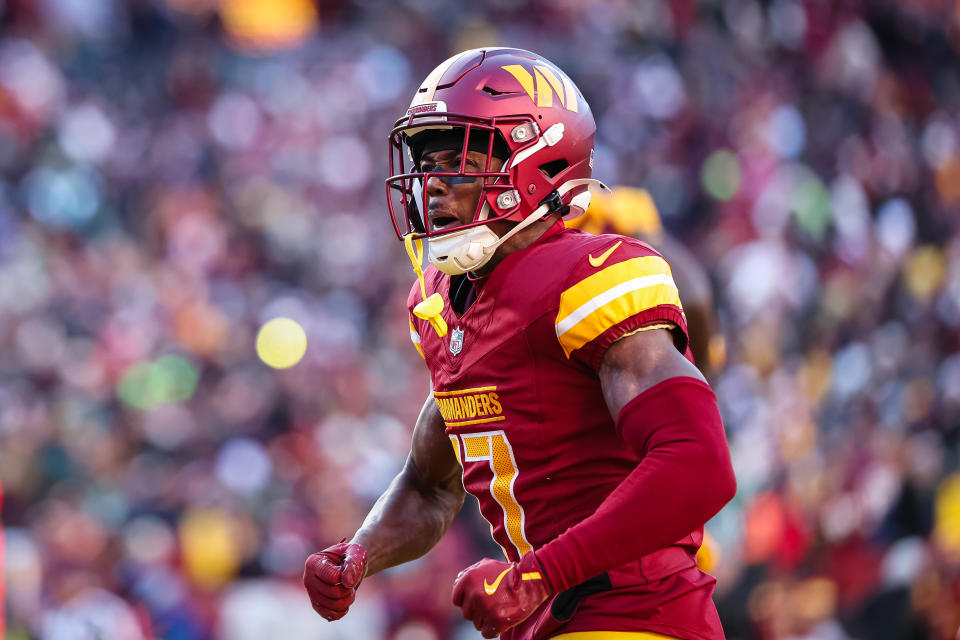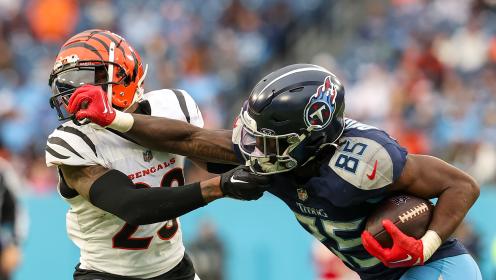
I could use a lot of words to describe this game we play.
The early season was exciting. Hope filled the minds of every gamer as they drafted and set their rosters. Back then, they knew this was their year. And early returns on popular dart throws like Rashid Shaheed and Chuba Hubbard boosted our confidence.
But then reality entered the conversation.
Injuries and swings in performance were frustrating. Apparently, New Orleans couldn’t sustain their 31.2 PPG pace after their hot start. Tee Higgins couldn’t get on the field until Week 3. The entire TE position needed a “national day” for us to stop wondering if we should invest high draft picks into them. But still, we trudged on through two “bye-pocalypses” (bye-pocalypsi?) to finally get to the playoffs, and one other word comes to mind.
Cruel.
A friend messaged me that he had lost by 0.5 points after outbursts from Jayden Daniels and Jonathan Taylor. Another had Daniels and Lamar Jackson but still had to sweat out a 20-point lead, as his opponent had Josh Jacobs heading into MNF. There’s no reprieve. The rollercoaster doesn’t stop until we get through one final week of chaos.
And unsurprisingly, the storylines from Week 16 were the perfect prelude to Championship Week.
Terry McLaurin is matchup-proof
Start your stars.
Honestly, this type of “sage-like” advice looks simplistic in hindsight. I mean, sure, Terry McLaurin is the WR5 on the season, has more TDs in ’24 than his last two campaigns combined and could set career-highs in receptions and yards with two games left. He checks most of the boxes to be a star. But I can’t think of another WR garnering more start/sit questions heading into Week 16.
Remember, Washington was facing Philadelphia for the second time. In their first meeting, McLaurin earned two targets. The Eagles’ secondary suffocated Jayden Daniels and held him under 200 passing yards for the second time as a rookie. Accordingly, the anchoring bias against starting McLaurin was real. So, of course, Washington’s WR1 gave us a top-12 moment when we needed it most.
Now, to be fair, McLaurin only had six looks from Daniels on the day. Olamide Zaccheaus led the Commanders with eight attempts and got some revenge on his former team. Jamison Crowder was the one who snagged the go-ahead score. So, McLaurin’s box score could’ve looked much different. However, his opportunity trend over the previous three weeks was enough to keep him in starting lineups.
-
Week 12: 18.0% (target share), 25.0% (air yard share), 0.0% (end-zone targets)
-
Week 13: 28.0%, 35.0%, 50.0%
-
Week 15: 36.0%, 75.0%, 100.0%
Noah Brown went on IR. Zach Ertz got concussed midway in Week 15. Daniels had fewer options. Watching McLaurin’s target share balloon was the signal he could perform in a tough matchup. Or, at the very least, Daniels would look to him when coverage allowed. And while CB Quinyon Mitchell has been one of the best rookie defenders, McLaurin got by him often enough to keep his (and our) playoff hopes alive.
Luckily, the Commanders have a lighter defense coming to Maryland on Sunday. The Falcons’ secondary has surrendered the fourth-most PPR PPG to opposing WRs. Coincidentally, they’re also susceptible to big plays. Jordan Addison and Justin Jefferson snuck by Atlanta for multiple touchdowns just a few weeks ago. Ladd McConkey worked the middle of the field for 117 yards. If McLaurin was more of a WR2 against the Eagles, he should firmly be in the top 12 to close out the fantasy playoffs.
The ‘Unsung Hero’ award for the playoffs goes to …
I had to think about this one for a minute, but I think the best answer is Jalen McMillan.
The former Huskie spent his first two games back after a hamstring injury watching Mike Evans re-establish himself as one of the premiere WRs in the NFL. Since then, he’s settled into a strong WR2 role in Tampa. Over the last three weeks, McMillan has top-20 marks in receiving yards and touchdowns on 6.7 targets per game. Assuming Chris Godwin’s ankle surgery holds him out until the middle of the 2025 season, McMillan may be the ADP frontrunner in offseason drafts. However, McMillan’s path to work is obscure, and some people (i.e., me) won’t feel as comfortable starting a rookie WR2 during the playoffs. So, here are two other candidates for unsung hero.
I was grimacing while it happened, but Tyjae Spears’ first TD against Cincinnati had style to it. Tony Pollard had re-aggravated his ankle injury after multiple missed practices, opening up more work for Spears. And even with Pollard active these last two weeks, Spears has been on the field more often than Tennessee’s RB1.
-
Snap Rate: 36.0% (Weeks 1-14), 57.0% (Weeks 15 & 16)
-
Rushing Share: 26.0%, 30.0%
-
Target Share: 8.0%, 14.0%
Pollard’s wallet might prefer he plays, but his practice participation (or lack thereof) will likely tell us a different story. Regardless, Spears’ usage as a goal-line option and receiver is worth rostering. A rematch against the Jaguars, who Pollard ran over for 102 yards, puts Spears in FLEX territory. He’d be the most unlikely savior for rosters competing for a championship, but still, another came to mind.
I don’t know what Kendre Miller said or did to former HC Dennis Allen. But it was enough to wind up in Allen’s doghouse and on IR. However, Alvin Kamara’s groin injury has thrust the TCU product into the RB1 spotlight. And while the boxscore doesn’t highlight his impact, Miller has been as efficient as the Saints’ primary rusher.
-
Rushing Success Rate: 57.1% (Miller), 45.6% (Kamara)
-
Forced Missed Tackle Rate: 39.3%, 18.0%
-
Explosive Run Rate: 25.0%, 15.6%
Unfortunately, Miller had to face the Packers on Monday night. Yes, Jordan Mims scored more PPR points (8.2 to 5.1). But Miller ran into more stacked boxes and was the only NOLA RB to break a tackle. So, let’s look at Week 17.
He’ll get to run into (more like run past) a Raiders’ Maxx Crosby-less defensive front that’s allowed the 13th-most rushing yards per game since their Week 10 bye. You’d have to go back to Week 1 to find an RB with double-digit carries and wind up with fewer than 10 PPR points against the Raiders (Gus Edwards, 11 carries for 26 yards).
So, while most of the stars from the ’24 season will be in your starting spots, these unsung RB heroes (and other RBs like Gus Edwards and Jerome Ford) to close out playoff runs will be the key to hoisting a title.
Michael Penix Jr. keeps the Falcons soaring
If you didn’t watch Michael Penix Jr.’s first game, his interception got the most buzz:
Box score scouts will come away with lukewarm takes. He didn’t throw a touchdown. We don’t get points for handoffs that turn into TDs. But that analysis misses a couple of key takeaways. For instance, the play-calling shifted in Penix’s debut.
-
Plays per Game: 63.1 (Weeks 1-15), 65.0 (Week 16)
-
Play-Action Rate: 7.6%, 9.2%
-
Dropback Over Expectation Rate: -5.0%, -2.0%
Admittedly, it’s a one-game sample. Regardless, more plays and more pass attempts relative to the game situation (i.e., down, distance, score, etc.) were expectations we had for the offense heading into the season. And despite establishing a two-possession lead by the half, Penix had an 84.6% dropback rate in the final two quarters. In addition, he looked immediately comfortable with the passing concepts.
Michael Penix Jr. was comfortable in the pocket, threw out breakers on time, and was able to work over the middle of the field
Penix Jr. also didn’t take a sack despite being pressured 14 times pic.twitter.com/sdPmB0sSJO
— Shawn Syed (@SyedSchemes) December 22, 2024
One of the concerns about Penix coming out of college was his ability to throw over the middle of the field. His 49.1% MoF throw rate was the lowest in this year’s class. However, Penix was able to connect with Drake London on in-breaking routes while still showing off his arm strength. At a mark of 0.16 EPA per dropback, Penix was more efficient than Kirk Cousins had been in six games.
Week 17 offers a similar environment.
Washington’s defensive front was able to make things difficult for Kenny Pickett on Sunday (43.3% pressure rate, 53.3% blitz rate). However, his receivers (outside of an untimely drop from DeVonta Smith) kept the offense moving. London and Darnell Mooney can do the same. So, while Penix shouldn’t be a QB in starting rosters for playoff teams, the rookie QB showed enough to make his WRs viable options for Week 17.
Green Bay’s offense is too good (for fantasy)
The prevailing wisdom for rostering players in projected blowouts is they should be part of why their team has a lead. Like, if the Bengals score 30 points, you’d assume Ja’Marr Chase got in on the action. Or, apparently, the Ravens’ success hinges on Derrick Henry rushing for more than 100 yards. Anyway, both examples highlight why the end of MNF wasn’t too much of a shock.
My condolences to anyone needing a miracle from Christian Watson or Romeo Doubs. But Spencer Rattler and a Kamara-less skill-position group weren’t going to force Green Bay into a fight. However, the beatdown should force us to re-examine the Packers’ tendencies on offense.
-
Passing Attempts per Game: 29.1, 27th (out of 34 qualifying starters – min. 200 dropbacks since Week 4)
-
Early-Down Passing Rate: 43.9%, 31st
-
Dropback Over Expectation Rate: -6.0%, T-29th
I mentioned the Bengals and Ravens earlier, as they encapsulate the two play-calling extremes. Joe Burrow lives in shotgun formations, and Lamar Jackson (literally) runs away from the competition. Regardless, knowing how each operates gives us an indication of what they’ll do to generate a lead. With Green Bay sitting in the latter offensive category, the WRs were at risk heading into Monday night. The week prior already presented us with red flags.
-
Romeo Doubs: 19.0% (target share), 19.0 (PPR points)
-
Jayden Reed: 23.0%, 11.1
-
Christian Watson: 23.0%, 8.6
The guys with the most targets generated the fewest fantasy points. It was Romeo Doubs coming down with two scores warranting FLEX consideration. However, in that same game, Jordan Love’s 28 dropbacks were the 10th-fewest of any starter. Green Bay had already established a multi-score lead by halftime, limiting its need to pass. It has given us its blueprint of how it responds to being in the driver’s seat. And it puts a cap on its passing game.
But Week 17 will be a different environment.
Love and company are traveling to Minnesota to face the Vikings. Sam Darnold’s crew ranks ninth in points scored per game on the season, and they’ve put up less than 20 points in a game just once since November. They’re the ideal opponent to push the Packers into a throwing contest. It’s not like they haven’t done it before. Plus, with Christian Watson’s knee injury, Reed and Doubs become more favorable options for fantasy managers looking for ceiling options in the fantasy finale.

